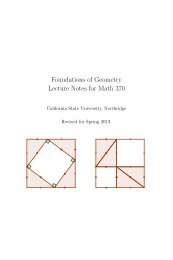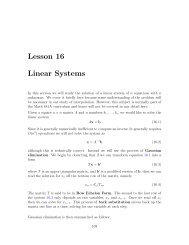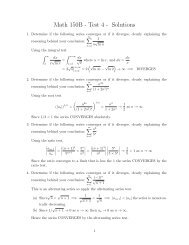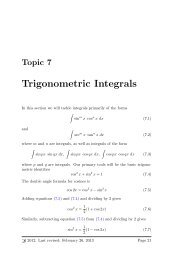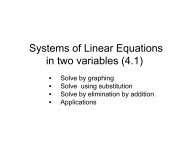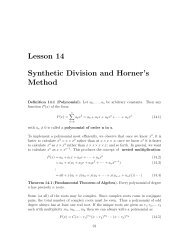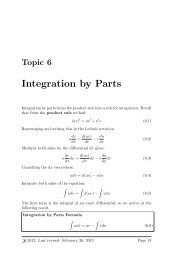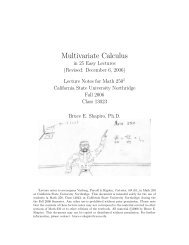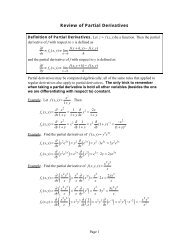The Computable Differential Equation Lecture ... - Bruce E. Shapiro
The Computable Differential Equation Lecture ... - Bruce E. Shapiro
The Computable Differential Equation Lecture ... - Bruce E. Shapiro
You also want an ePaper? Increase the reach of your titles
YUMPU automatically turns print PDFs into web optimized ePapers that Google loves.
64 CHAPTER 3. APPROXIMATE SOLUTIONS<br />
This proves Weierstrass’ Approximation theorem for a piecewise linear function.<br />
Since you can approximate any continuous function arbitrarily closely by a piecewise<br />
linear function this proves the theorem for any continuous function.<br />
3.7 Peano Existence <strong>The</strong>orem<br />
Our proof of the existence of a solution to the general IVP requires a Lipshitz<br />
Condition be placed upon f(t, y). It turns out that this condition is not necessary.<br />
Equicontinuity<br />
Definition 3.2. Let f k (t 1 , t 2 , . . . ) be a sequence of functions. <strong>The</strong>n we say that the<br />
set of functions {f k } is Uniformly Bounded if there exists some number M ∈ R<br />
such that for all t 1 , t 2 , ...., k,<br />
|f k (t 1 , t 2 , . . . )| ≤ M (3.186)<br />
In particular, the constant M is the same for every function in the set.<br />
Definition 3.3. A set S of functions f(t) is equicontinuous over an interval [a, b]<br />
if for any ɛ > 0 there exists a δ > 0 such that whenever t, ˜t ∈ [a, b],<br />
for functions f ∈ S.<br />
|t − ˜t| ≤ δ =⇒ |f(t 1 ) − f(t 2 )| ≤ ɛ (3.187)<br />
Lemma 3.3. Suppose that S is an infinite set of uniformly bounded, equicontinuous<br />
functions on [a, b]. <strong>The</strong> S contains a sequence that converges uniformly on [a, b].<br />
=⇒<br />
<strong>The</strong>orem 3.10 (Peano). Let D = [t 0 − a, t 0 + a] × [y 0 − b] × [y 0 + b]; Suppose<br />
that f(t, y) ∈ C(D) be bounded by M. <strong>The</strong>n there is a solution to the initial value<br />
problem<br />
for |t − t 0 | < h = min(a, b/M).<br />
y ′ = f(t, y) (3.188)<br />
y(t 0 ) = y 0 (3.189)<br />
Proof. Let ɛ n → 0 be a sequence of numbers, and P n (t, y) be a sequence of polynomials<br />
such that<br />
on<br />
|P n (t, y) − f(t, y)| ≤ ɛ n (3.190)<br />
t 0 − h ≤t ≤ t 0 + h (3.191)<br />
y 0 − Mh ≤y ≤ y 0 + Mh (3.192)<br />
Math 582B, Spring 2007<br />
California State University Northridge<br />
c○2007, B.E.<strong>Shapiro</strong><br />
Last revised: May 23, 2007




